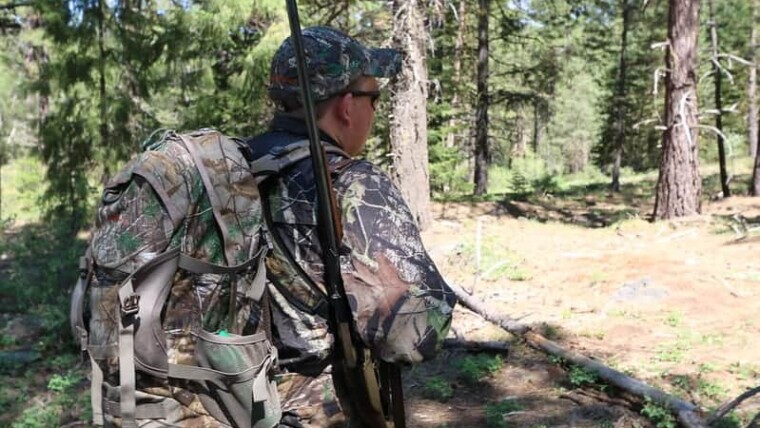When your life partner disapproves of your lifelong passion, you can certainly find yourself in a difficult position. How do you reconcile eagerly awaiting the start of deer hunting season with awaiting the disapproving stare (or argument) that will surely ensue as your highly anticipated hunt nears? Similar to the conflicts that may ensue when a meat-lover falls for a diehard vegan, the resolution may seem impossible. Fortunately, the following guidance will help provide you with the tools needed to assuage most spousal sources of conflict. Through careful reflection, thoughtful discussion, equitable compromise, and confident resolution, you may find yourself hunting even more joyfully next time, released from the fear of the inevitable battle at home.
Tips for Appeasing Your Spouse
Some conflicts are superficial, such as which Netflix show to watch or which restaurant to go to on the weekend. These types of disagreements do not usually require extensive thought and reflection. However, to address a more serious, ongoing conflict effectively will require some additional actions taken by both parties. The following sections will outline different steps and methods for resolving the dilemma with your spouse, which will free up additional energy for your hunt.
Reflection
Before commencing a potentially volatile discussion, it is probably a good idea to take a step back and think more critically about why exactly your spouse seems resistant, or downright opposed, to your passion for hunting. Maybe you know exactly why your spouse hates your hunting passion, or maybe you know why they hate it, you just know that they do. If you’re not yet sure of the exact reason, it’s worth reflecting upon, which will contribute to a more fruitful discussion once it occurs. Furthermore, understanding the real source of hatred will also shed light on the likelihood of imminent conflict resolution.
For instance, does your spouse detest hunting itself, or does your spouse detest the time spent away hunting? A good analogy for this question is the consideration of football season: Do spouses really hate football that much, or do they really hate the time and attention taken away from them in favor of another pursuit? Or does your spouse fundamentally oppose hunting based upon personal beliefs? Admittedly, the issue presented in the latter question will be more difficult to resolve, though it is addressed in the “Related Questions” below.
Discussion
After reflecting on the degree of your spouse’s dislike of your passion, one of the next best steps to take would be to address a serious conflict is to have a calm, thoughtful discussion. Given the potential length and seriousness of this conversation, it would be ideal to select a time and place that works well for both parties, a good starting point for forming a compromise. What will be even more ideal is to arrive at the discussion the same way you might arrive at a business: Instead of coming prepared for a fight, arrive with an understanding of the conflict and a determination to fix it.
When having the discussion, ensure that you actively listen at all times, noting the difference between passive and active listening. Passive listening involves hearing words without necessarily understanding or caring about the significance of them to the speaker behind them; active listening involves listening openly and thoughtfully, fully considering the significance of the words to the speaker. In short, passive listeners may retort, whereas active listeners respond. Ask questions to clarify as needed, which will enhance the likelihood of a successful outcome.
Depending on how contentious the discussion may become, it’s not a bad idea to set up some basic ground rules in advance. Definitely ensure each person has equitable time to speak, and ensure that the other person is done speaking before replying. As simplistic as these recommendations may sound, some of life’s best advice is oftentimes the most simple.
Compromise
This step may or may not be necessary, depending on the direction your discussion takes, but there is a high likelihood that compromise will be necessary to achieve any lasting problem resolution. Much like individual couples, compromise will vary greatly; what works for one marriage may not work for another, and vice versa.
For instance, suppose the main point of consternation is the time spent away from the spouse, rather than the hunt itself. Do you find yourself gone at the same time every year, or do you tend to leap at every possible hunting opportunity? In other words, does your spouse become angry about pre-planned trips, or is it the “spur of the moment” hunts that tend to attract the most wrath? Regardless of individual circumstances, understanding your spouse’s needs will be requisite to formulating an effective compromise. If the primary issue is time, then a compromise can and will work out, provided both parties consistently respect the compromise.
Resolution
It is critical to keep in mind that agreeing to a compromise does not represent the final step in conflict resolution; following through on the compromise consistently does. An agreement is only as good as its mutual reinforcement, and if both you and your spouse are genuinely satisfied with the compromise in that particular context, then the previous conflict has been resolved. For this reason, consistency of whichever compromise you reach is crucial.
However, should either party suddenly change their position or mind for whichever reason, the compromise is no longer functioning as it was intended to. Suppose you agree to two hunting trips per year instead of four, yet suddenly turn around and beg for a third trip once a new opportunity arises. While your spouse may respect this request, it would be especially important to make other concessions as needed, which should come naturally in a home environment that stresses empathy and connection.
Additional Considerations
While reflection, discussion, compromise, and resolution form the fundamental blocks of constructively addressing your spouse’s displeasure with your hunting passion, it is always good to remember the power of empathy and connection.
Empathy
Depending on your spouse’s personality, it is possible that they may be unhappy or uncomfortable, yet also avoid voicing their real thoughts and feelings in an effort to avoid conflict. At this point, empathy, or placing yourself in someone else’s shoes, plays a big role in enhancing your marriage’s health. Even if empathy is not perfectly executed, attempts at empathy are better than none.
For instance, suppose you made a compromise that truthfully benefits you more than your spouse. Be open to revisiting the compromise and reworking the terms in such a way that your spouse truly does feel valued and accepted. Alternatively, suppose you both were in full agreement to the compromise at the time, but then something serious occurs to threaten it, such as job loss or major illness. Clearly, it would be another appropriate time to revisit terms.
Connection
Ultimately, empathy will strengthen the connection with your spouse, and connecting with your spouse consistently is one of the best ways to stave off not only fights related to hunting, but also fights on virtually any topic, period. Showing your spouse that they are valued beyond the ultimate Big Buck is a surefire way to re-establish chemistry and connection. Think of a passion that you and your spouse may mutually enjoy on a consistent basis, whether it’s an annual vacation or a simple walk in the woods.
Related Questions
What should I do if my spouse is an avid vegan?
Keeping in mind the aforementioned empathy, it may not be the best idea to convert your buck into deer meat around your spouse. Assuming your spouse has no issue with your carnivorous diet, it may be best to have a social hunters’ night wherein you all can literally enjoy the fruits of your labor. Ideally, this night will align with one in which your spouse was planning to spend with a different set of friends.
What should I do if my spouse absolutely will not compromise?
This question is difficult, and it’s frankly tempting to leave out of “Related Questions” entirely. However, it is perhaps one of the most important considerations of all, particularly if none of the above guidelines can address your specific quandary. If your spouse will not compromise on any level, the most appropriate advice on this forum entails the following: It may be time to seek help from a third party in mediating the discussion, which would be preferable to other options.








